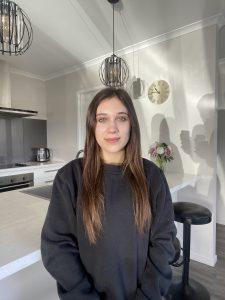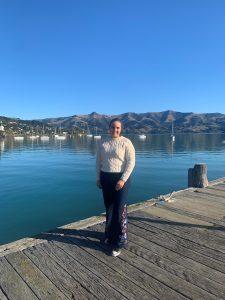Q & A:Lydia Frater and Lily Sanson, HERA Whanake Scholarship Recipients
HERA, in collaboration with the Māori Education Trust, created the Whanake scholarship in 2018, to foster genuine interactions with young Māori and actively extend the industry’s capacity by creating a more diverse and attractive industry for Kiwi.
The scholarship is targeted at Māori students in their first year of a four-year Bachelor of Engineering degree and extends over the four years required for degree completion.
To date, there have been three full recipients of the scholarship – Sarah Lawson, Lily Sanson and Lydia Frater, who was recently announced as the 2022 scholarship recipient.
A further three students have received one-year scholarships to support their first year of studies. HERA spoke with Lily and Lydia about their scholarship experience so far, and their thoughts on the engineering industry within New Zealand.
What drew you to engineering and the Whanake scholarship?
 Lydia: I didn’t even know what engineering was until my last year of high school. I always did well in the sciences at school, however no one introduced the idea of engineering to me until I attended a Rotary science camp, which sparked my interest.
Lydia: I didn’t even know what engineering was until my last year of high school. I always did well in the sciences at school, however no one introduced the idea of engineering to me until I attended a Rotary science camp, which sparked my interest.
From there, I proactively spoke to one of my head teachers who helped and directed me on the right pathway. I later found out my grandfather had been an engineer, so there is a beauty in that for me.
Lily: I knew from a young age engineering was interesting to me, but never knew the term. Then my sister mentioned it at dinner, which led to me learning more about it.
The Pūhoro STEM Academy actively encouraged and supported my studies which definitely helped my journey into the engineering industry.
On scholarships, my whānau instilled early on how important they are, so in addition, I feel very grateful to have received the HERA Whanake Scholarship as well as the Keystone AECOM Property Scholarship.
Both have enabled me to do some exciting internships over the summer breaks.
Lydia: There was a lot of stigma around applying for scholarships as a Māori in my high-school. However, once I knew what I wanted to do and understood that it’s about Māori supporting Māori, I started applying for scholarships.
My brother was the one who suggested I apply for the Whanake Scholarship, which I originally didn’t think I’d receive as it is quite significant. I am very happy to have received this opportunity.
Why do you think there aren’t more wāhine in engineering?
Lily: I personally think the education systems in New Zealand, notably NCEA, aren’t designed for Māori to succeed. I’ve seen friends in high school struggle and be shut out of STEM subjects, which I feel is rooted in colonisation as you have to essentially choose between connecting to your culture or getting into academia.
I think that has a huge impact on why there aren’t more wāhine Māori in engineering and STEM subjects generally.
Lydia: I agree with Lily. I took a whakapapa performing arts course in high school, which isn’t counted towards NCEA credits for example.
Things like that are incredibly discouraging to Māori as it doesn’t allow students to bring their culture and academics to the fore simultaneously.
What if any common connections do you see between the Māori worldview and engineering?
Lydia: Having anything built in New Zealand is going to involve Māori. From the different chemical processing and environmental questions to the simple act of dealing with people on the land – there are a lot of bridges between the two.
This is why I think it’d be helpful to introduce the bicultural lens earlier on.
 Lily: Absolutely, there are so many connections. And, the further along the degree I get, the more I’m finding biculturalism incorporated in papers.
Lily: Absolutely, there are so many connections. And, the further along the degree I get, the more I’m finding biculturalism incorporated in papers.
I recently had a conversation with a professor about applying a mana whenua lens on a climate change paper. He was very encouraging about this and I think there are efforts being made to interconnect worldviews more.
What challenges do you see for Māori in the pathway?
Lydia: When I was in high school, I had a strong group of Māori friends and connections. Leaving them all behind was a challenge, especially as I was so involved with my culture at school.
As university and the engineering degree itself is at quite a large scale, it can be hard to find those connections again while you’re still trying to figure out how everything works in your first year, like I am currently.
Lily: I also think finding a balance between doing well academically and maintaining your culture can be very difficult. I do think there needs to be Māori top-down, fully involved – not just tokenistic – representation at all levels.
I believe collaborating between the non-Māori and Māori perspectives can have a huge positive impact.
What can businesses do to shift perspectives and engage with students earlier?
Lily: I recently read somewhere that to make a change in the number of Māori in engineering, we really need to engage with students as early as Year 6.
Developing science skills then is incredibly important. This can include companies funding scholarships but also events that lead to higher outcomes behind the scenes, and still at school.
Lydia: In addition, when it comes to attracting workers, showing inclusiveness and acceptance to mātauranga Māori is a big factor in my view.
However, it really extends to being inclusive to all worldviews and cultural believes. For someone at the beginning of their journey like me, it’s really encouraging and inspiring to see other wāhine working in engineering firms across the country and advocating for Māori in the field.
Lily: Absolutely. If you can see that commitment to biculturalism is embedded in the foundations of an organisation, that would be a big tick for me.
It’s not about consultation but collaboration with mana whenua – that’s how I’d like to work in the industry.
To find out more about the HERA Whanake scholarship and its recipients, visit www.hera.org.nz or listen the latest Stirring The Pot podcast episode with Lily and Lydia – https://www.hera.org.nz/podcast/
HERA is a non-profit research organisation dedicated to serving the needs of metal-based industries in New Zealand. It is the industry stimulus for research, innovation and development, delivering a trusted national centre for design, manufacturing technology and quality assurance. Want to become a member? Visit www.hera.org.nz.



